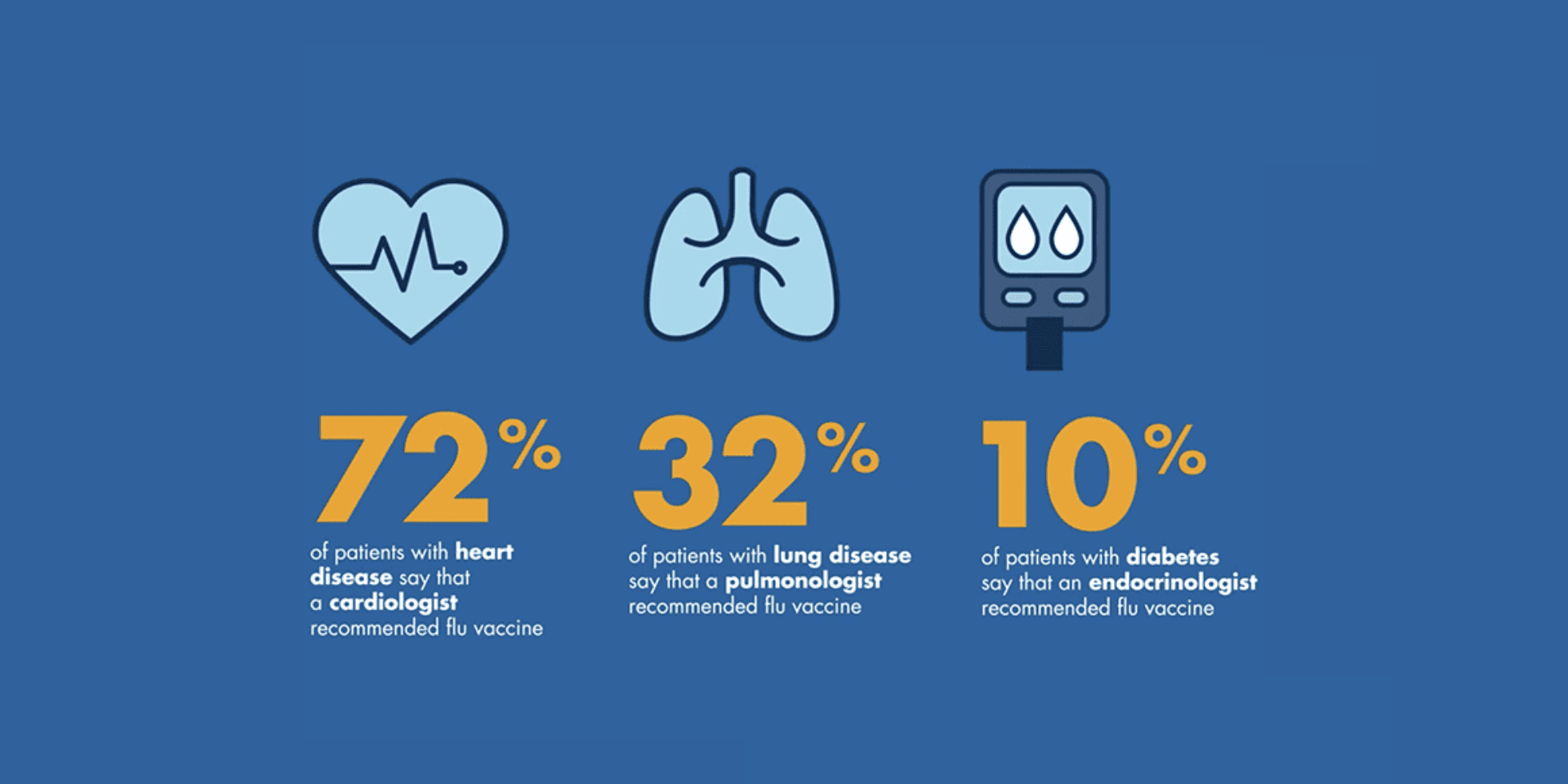
Anyone can get sick with influenza (flu), but adults with certain chronic health conditions, including heart disease, lung disease, and diabetes, are at increased risk of flu-related complications and exacerbation of underlying disease, even when the condition is well-controlled, due to the effects of flu-related inflammation that may occur long after acute infection. There is an urgent need to raise awareness of both the dangers of flu and the benefits of vaccination in adults with chronic health conditions.
The National Foundation for Infectious Diseases (NFID) commissioned two national surveys (conducted online from October 28-November 8, 2021) to better understand knowledge, attitudes, and practices toward flu and pneumococcal vaccination as well as communication between healthcare professionals (HCPs) and adult patients with chronic health conditions.
Summary of Key Results
Less than half of patients with chronic health conditions report having been vaccinated against flu
- Less than half of patients with chronic health conditions (45 percent) report having received an annual flu vaccine by early November. Another 2 in 5 (40 percent) say they still plan to get a flu vaccine during the current flu season.
- 75 percent of patients who have received or plan to get a flu vaccine are doing so to protect themselves, 61 percent do so to protect their family, and 62 percent cite avoiding getting sick with the flu during the COVID-19 pandemic as a reason for getting their annual flu vaccine
- 93 percent of patients agree that annual flu vaccination is the best way to prevent flu-related hospitalizations and death
HCPs are not consistently recommending annual flu vaccination
- Less than a third of HCPs (31 percent) say they recommend annual flu vaccination to all of their patients with chronic health conditions
- 44 percent of HCPs say they recommend annual flu vaccination to most of their patients with chronic health conditions
- 20 percent say they recommend annual flu vaccination to about half of their patients with chronic health conditions
- 5 percent say they recommend it to about a quarter of their patients with chronic health conditions
Nearly all patients are getting recommendations from an HCP to get vaccinated, but cardiologists lead among specialists
- Most patients with chronic health conditions (86 percent) say an HCP recommended they get a flu vaccine in the past year
- More than half (56 percent) of patients received this recommendation from a primary care physician
- 72 percent of patients with a cardiovascular condition said a cardiologist recommended they get a flu vaccine
- 32 percent of patients with a lung condition said a pulmonologist recommended they get a flu vaccine
- 10 percent of patients with diabetes say an endocrinologist recommended they get a flu vaccine
Patients and HCPs have different perceptions of risk communication
- Nearly half of patients with chronic health conditions (48 percent) report they have never been told by an HCP that flu would put them at increased risk for serious complications and can make their condition harder to manage
- Yet, 77 percent of HCPs who recommend annual flu vaccination to their patients report that they tell patients with chronic health conditions that their condition puts them at greater risk of flu-related complications, and 71 percent tell their patients that their conditions can become harder to manage
- Diabetes patients are less likely to be informed by HCPs about their risk for flu-related complications: 62 percent of patients with diabetes said they were not advised about the potentially serious consequences of flu, compared to 47 percent of those with a lung condition and 36 percent of patients with a heart condition
Patients are more likely to get vaccinated if an HCP recommends it
- More than half of patients (51 percent) with chronic health conditions who have received or plan to get an annual flu vaccine are motivated by an HCP recommendation
- Nearly half (47 percent) of patients who are unsure or do not plan to get vaccinated say they would be more likely to get a flu vaccine if an HCP recommended it
- About one quarter of patients not planning to get a flu vaccine or unsure about doing so say they would be more likely to get one if they received a referral from an HCP to a local pharmacy (26 percent) or a prescription for a flu vaccine from an HCP (23 percent)
- More than half of patients (51 percent) not planning to get a flu vaccine or unsure about doing so say they would be more likely to get a flu vaccine if an HCP provided it during a regularly scheduled appointment
Communicating the benefits of flu vaccination increases vaccination intention
- 36 percent of patients do not recall being told by an HCP that annual flu vaccination is critical for controlling their chronic health condition
- 90 percent of patients who have been told by an HCP that annual flu vaccination is critical for controlling their condition have received or plan to get a flu vaccine versus 74 percent of those who have not been told
Patient decisions influenced by lack of an HCP recommendation as well as misconceptions about flu
- More than a quarter of patients (26 percent) who are unsure about getting a flu vaccine or have decided not to get it report at least part of their reason is that an HCP has not recommended it
- Among those who do not plan to get a vaccine or are undecided, 32 percent are worried about getting flu from the vaccine, 30 percent are concerned about experiencing side effects, and 26 percent believe flu vaccines do not work very well
Cardiologists are more like to offer flu vaccination
- Only two thirds of HCPs who recommend flu vaccination to patients with chronic health conditions (67 percent) say the location where they work offers flu vaccines
- 75 percent of cardiologists report that the location where they work offers flu vaccines to patients, compared with 71 percent of primary care physicians, 61 percent of endocrinologists, and 60 percent of pulmonologists
A majority of specialists who do not offer flu vaccination believe it is the responsibility of the primary care physician
- Among specialists who do not offer flu vaccines at their work location, a sizable portion of cardiologists (72 percent), endocrinologists (67 percent), and pulmonologists (50 percent) report it is because vaccination is the responsibility of the primary care physician, which is problematic because less than 2 in 3 patients with chronic health conditions (65 percent) report seeing a primary care physician at least once a year
Nearly half of patients with chronic conditions have been vaccinated against pneumococcal disease
- Nearly two thirds of patients with chronic health conditions (63 percent) say they have been advised by an HCP to get vaccinated against pneumococcal disease, and nearly half (49 percent) have done so
- Similarly, two thirds of HCPs (67 percent) say they recommend pneumococcal vaccination to their patients with chronic health conditions, including pulmonologists (88 percent), cardiologists (70 percent), primary care professionals (59 percent), and endocrinologists (51 percent)
Survey Implications
Survey findings reinforce the importance of HCP and patient conversations about flu vaccination for adults with chronic health conditions. HCPs should continue to strongly recommend and offer both flu and pneumococcal vaccination. Specialists need to inform their patients about their increased risk for complications from flu. Removing barriers such as offering vaccination or a vaccine referral during routine care appointments may help to increase vaccination rates among this population.
- HCPs must strongly and consistently recommend annual flu vaccination to all patients with chronic health conditions
- Both flu and pneumococcal vaccination should be part of the routine management of patients with chronic health conditions
- Even in cases when vaccination does not prevent infection completely, it can help reduce the severity and duration of illness and prevent serious complications, including hospitalization and death
- Adults with certain chronic health conditions are at high risk of developing serous flu-related complications:
- People with heart disease are 6 times more likely to have a heart attack within 7 days of flu infection
- People with asthma and/or COPD are at greater risk of serious flu-related complications
- People with diabetes are 6 times more likely to be hospitalized from flu and 3 times more likely to die
- Flu and pneumococcal vaccines may be given at the same time as COVID-19 vaccines
About the National Foundation for Infectious Diseases
Founded in 1973, the National Foundation for Infectious Diseases (NFID) is a non-profit 501(c)(3) organization dedicated to educating the public and healthcare professionals about the burden, causes, prevention, diagnosis, and treatment of infectious diseases across the lifespan. For more information, visit www.nfid.org.
About the Surveys
The 2021 Chronic Health Conditions Survey of Healthcare Professionals was conducted by Wakefield Research among 400 providers from the following specialties: endocrinologists, primary care physicians, cardiologists, and pulmonologists. The survey was conducted from October 28-November 8, 2021, via an online survey.
The 2021 Chronic Health Conditions Survey of Adult Patients was conducted by Wakefield Research among 300 patients who have been treated for any of the following conditions: diabetes, chronic lung conditions such as COPD or asthma, and cardiovascular conditions such as heart attack, heart disease, or heart failure. The survey was conducted from October 28-November 8, 2021, via an online survey.
Results of any sample are subject to sampling variation. The magnitude of the variation is measurable and is affected by the number of interviews and the level of the percentages expressing the results. For the interviews conducted in this particular study, the chances are 95 in 100 that a survey result does not vary, plus or minus, by more than 4.9 percentage points for the Healthcare Professionals Survey and 5.7 percentage points for the Adult Patients Survey from the result that would be obtained if interviews had been conducted with all persons in the universe represented by the sample.
Funding was provided by AstraZeneca, Genentech, GSK, Merck & Co., Inc., Sanofi Pasteur, and Seqirus. NFID policies prohibit funders from controlling program content.
Learn more at www.nfid.org/LowerYourFluRisk
December 2021
Related Resources

Show Up and Fight Flu Partner Toolkit
Graphics and other resources to raise awareness about the burden of flu and increase vaccination rates among US Black adults

Leading By Example
National initiative calling on community leaders to lead by example by making a commitment to disease prevention
